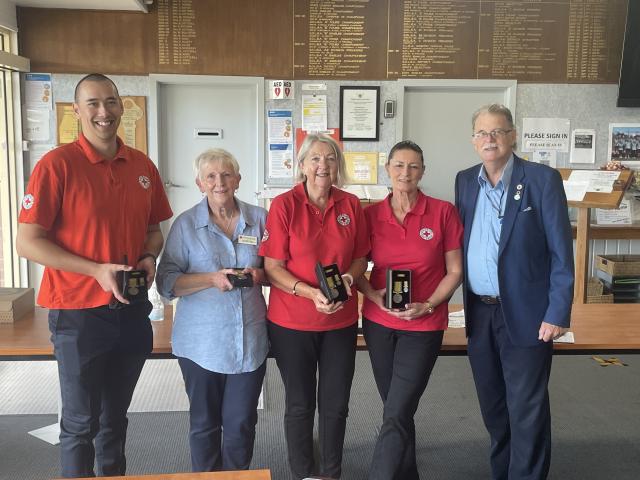Twelve Red Cross volunteers from across the region have been recognised with National Emergency Medals for their work to support the community during the 2020 Gippsland bushfires.
Red Cross Inner Barwon Emergency Service Division volunteers Lynette Houldcroft, Pamela Halnon, Jennifer Schoof, Lisa Carr, Kerri McFarlene, Julie McNamara, Pamela Aylwood, Melanie Peverill, Jeannette Benson, Alex Suwitra, Colin Anderson and the group’s operations officer Elaine Anderson were awarded the medals at a Red Cross meeting on Wednesday, March 16.
All 12 volunteers were recognised with the honour, awarded by the governor-general of Australia, for their efforts to support the affected communities during the bushfire.
Ms Anderson said each recipient “demonstrated the outstanding devotion to their fellow human beings during the emergency”.
“Many served in outlying and often isolated evacuation centres helping those who had been most affected by the fires. Some were in Mallacoota the night the sky went red and were on the beach trying to shelter from a sky full of falling embers,” she said.
“All are volunteers, all ordinary people serving Red Cross, and their fellow human beings, in an extraordinary manner.”
Several of the volunteers were unable to receive their awards last week as they had again been deployed to help communities affected by floods in Queensland.
Mr Suwitra led a team of Red Cross volunteers from Geelong, Bellarine and the Surf Coast that headed over to Gippsland at the start of the crisis.
“Initially the plan was to get into Mallacoota at the very beginning of the fires when everything was pretty full on, but the situation was too dangerous for us to actually get in there,” he said.
“So we essentially worked our way along the coast working with the local governments and the state government in different relief centres, supporting other agencies in providing psychological first aid and assistance to people that were moving out of the way of the fires.
“After a couple of days in that support role, we were told that the skies had opened up enough to be flown into Mallacoota with the ADF on a military helicopter.
“We were there for a couple of days just to provide immediate assistance to people that needed it.
“The most at risk people were being flown out by the ADF, but everyone else was joining a registration queue to get taken out on the naval ships that were coming.
“We were there to play a bit of a coordinating role with the other agencies, but more importantly just to talk to people and listen to their experiences and help them process some of that.
“Just having someone there to have a chat was such a valuable thing.”
A Red Cross volunteer since 2015, Mr Suwitra said it was unlike anything he had experienced before.
“It was pretty surreal. I’ve been in bushfires before for Red Cross but just the scale of the fires that had occurred [was different],” he said.
“The town was full of locals but also tourists, and I think a lot of people were scared and confused. There was that sense that people weren’t quite sure what was happening or what was coming next.
“It was quite a surreal experience to be running up and down the main street between different centres that were chasing information to support people at the same time as watching the fire burning on the horizon.
“But I felt like we were able to do quite a lot of good, so it’s something I’m quite proud of.
“I think what we do most of the time is probably not glamorous, or not something that would you would see on TV. It’s really just helping people either prepare for really bad days – like what that was – or helping them on the day itself and then afterwards as well.”
Mr Suwitra and his team spent about three days in Mallacota before they split, with Mr Suwitra and some volunteers boarding the HMAS Choules to support the 1300 locals and tourists evacuated by boat.
“That was a whole different experience, to have that many people and animals on a boat that wasn’t designed for that,” he said.
“But the feeling on that ship was something different – the sense of community on the ship coming back was something special and people were genuinely thankful and keen to support each other through what they had just been through.
“There were people that didn’t get off the ship when it got to the other side because they decided they were going back to help. And I think that just sums up Australian spirit.”









